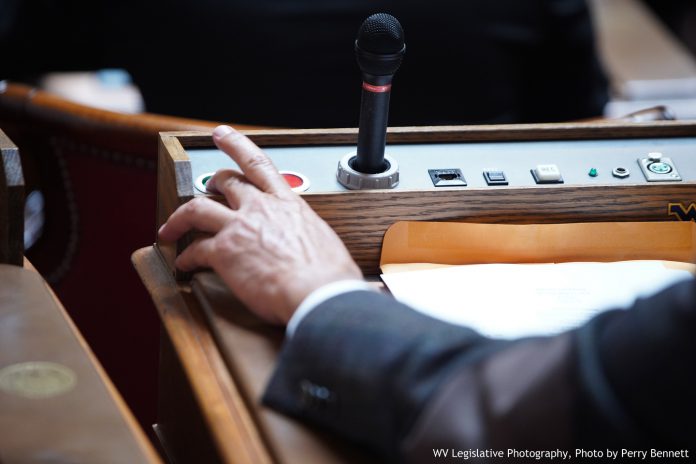As of 4 p.m. March 16, 2005, the 36th day of the Regular Session, 1074 bills have been introduced in the House of Delegates. Of those, 11 have been passed by the House since March 9 and have been sent to the Senate for further consideration.
House Bill 2002 would create a system of bail bond forfeiture procedures. The bill would require an arrest warrant for any defendants receiving to bail and then failing to appear in court. The court would allow 90 days for the underwriter to produce the defendant.
House Bill 2078 would require the spaying or neutering of dogs or cats adopted from humane shelters or county animal shelters. Persons could only adopt animals if they have previously been spayed or neutered; if a veterinarian performed the procedure at the shelter; or, if the person signs a document promising to have the animal spayed or neutered within 30 days of adoption. Nothing in the bill would authorize an agency to spay or neuter a dog or cat if the dog or cat is claimed by and returned to its owner within five days of being captured.
House Bill 2150 would expand the locations where one could file a child abuse or neglect petition. Current law requires the complaint to be filed in the county where the child resides, but this bill would expand the sites to the county where the offender resides, or where the abuse or neglect occurred. However, a petition may not be filed in more than one county if it is based on the same set of facts.
House Bill 2227 would prescribe minimum standards for municipal judges by requiring them to continue their education by attending training sessions at least twice during their term. It also would require those applying for municipal judgeships to undergo a criminal background check conducted by the West Virginia State Police. If the applicant were guilty of committing a misdemeanor or a felony involving a crime reflecting bad character, or corruption, he or she would not be eligible to become a municipal judge.
House Bill 2271 would eliminate conflicting provisions found in the West Virginia Code concerning the award of expert fees in child neglect and abuse proceedings. The bill would strike the language that says the court of order shall provide for the payment of expert witnesses.
House Bill 2523 would make it a misdemeanor for a former inmate to contact any employees of the Department of Corrections without specific written consent. It also would require that inmates be informed of this law upon release. Any persons guilty of violating this law would be subject to a maximum fine of $500.
House Bill 2525 would remove a provision from the West Virginia Code that requires the State Board of Education to contract with an independent agency to evaluate the results of character education and report these results to the Legislative Oversight Commission on Education.
House Bill 2527 would authorize employees of multi-county vocational schools to administer performance tests for service personnel in the counties served by the school. Current law allows only employees of the county board of education to administer the tests.
House Bill 2813 would remove the requirement that a public utility must first obtain a certificate of public convenience and necessity from the Public Service Commission before it can apply for other necessary licenses and permits.
House Bill 2869 would allow corporations in this state to convert to limited liability companies. The corporation’s Board of Governors would lay out a plan of conversion and approval of the implementation would require an affirmative vote from each shareholder. If the measure were approved by shareholders, then the Secretary of State would issue a certificate of conversion.
A Sampling of Bills Introduced In The House
House Bill 2815 would expand the use of a child passenger restraint device or a booster seat from four to six years of age and from 40 pounds to 60 pounds.
House Bill 2816 would create the West Virginia Healthy Act of 2005. The bill would establish that soft drinks sold through vending machines would not be permitted in areas accessible to students in an elementary school or middle/junior high school. In addition, senior high schools offering soft drinks in vending machines must offer the same amount of healthy beverages. The bill also would require minimum amounts of physical activity for students in grades K through 12.
House Bill 2992 would include the participation in the operation of a clandestine drug lab involving destructive devices, explosive materials or incendiary devices as a crime of wanton endangerment.
House Bill 3040 would provide maximum time limits for one-way bus transportation for any new bus route created to transport students if their particular schools were closed or consolidated. The limitations could only be dismissed if a separate vote by a county board, the School Building Authority and the State Board of Education approved.
House Bill 3047 would add the use of any substance or object to produce methamphetamines as a misdemeanor in the West Virginia Code. It goes further to note if any person produces more than 10 pounds of methamphetamines in 24 hours, then he/she would be guilty of a felony and would be jailed for at least 26 years and fined anywhere from $100,000 to $1 million dollars. The bill also notes that if a person operates or attempts to operate a methamphetamine laboratory in the presence of a child under the age of 18, then he/she is also guilty of a felony. Offenders would not be eligible for parole until the minimum term was served.
House Bill 3049 would add a new section to the Code regarding reckless actions relative to starting a fire. Any person who creates carelessly and without provocation a substantial risk of death or serious bodily injury to another, is guilty of a felony. If convicted, the person will be sentenced from two to 10 years and fined up to $10,000.

